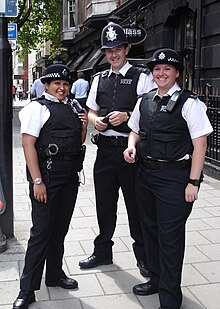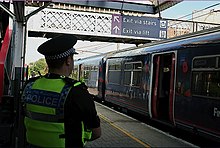
Back Storbritanniens politi Danish Polizei (Vereinigtes Königreich) German Polizia Erresuma Batuan Basque Police au Royaume-Uni French イギリスの警察 Japanese Storbritannias politi NB Policja w Wielkiej Brytanii Polish Правоохранительные органы Великобритании Russian Polisen i Storbritannien Swedish



Law enforcement in the United Kingdom is organised separately in each of the legal systems of the United Kingdom: England and Wales, Scotland, and Northern Ireland.[nb 1] Most law enforcement duties are carried out by those who hold the office of police constable of a territorial police force.
As of 2021, there were 39 territorial police forces in England, 4 in Wales, a single police force in Scotland, and a single police force in Northern Ireland.[1] These territorial police forces are responsible for most law enforcement and crime reduction in their respective police areas.[nb 2] In terms of national government the territorial police forces of England and Wales are overseen by the Home Office, although are operationally independent from government. The British Transport Police (BTP), the Ministry of Defence Police (MDP), and the Civil Nuclear Constabulary (CNC) provide specialist policing services in England, Scotland and Wales. The National Crime Agency (NCA) is primarily tasked with tackling organised crime and has been compared to the Federal Bureau of Investigation (FBI) in the United States.[2][3]
Police constables are granted certain powers to enable them to execute their duties. Their primary duties are the protection of life and property, preservation of the peace, and prevention and detection of criminal offences.[4] In the British model of policing, police officers exercise their police powers with the implicit consent of the public. "Policing by consent" is the phrase used to describe this. It expresses that the legitimacy of policing in the eyes of the public is based upon a general consensus of support that follows from transparency about their powers, their integrity in exercising those powers and their accountability for doing so.[5][6]
Most police constables in England, Scotland and Wales do not carry firearms. As of 2022, there were 142,526 police officers in England and Wales, 6,192 of which were firearms authorised.[7]
Cite error: There are <ref group=nb> tags on this page, but the references will not show without a {{reflist|group=nb}} template (see the help page).
- ^ Brown, Jennifer. "Policing in the UK". House of Commons Library.
- ^ "The National Crime Agency: Does Britain need an FBI?". www.telegraph.co.uk. Retrieved 20 July 2023.
- ^ "'Britain's FBI' could take over terror fight from police". The Independent. 1 January 2016. Retrieved 20 July 2023.
- ^ "Code of Conduct for Police Officers" (PDF). North Yorkshire Police Federation. Retrieved 28 December 2014.
- ^ "Policing by consent". UK Government Home Office. 10 December 2012. Retrieved 1 December 2013.
- ^ "Surveillance Camera Code of Practice" (PDF). UK Government Home Office. June 2013. p. 5. Retrieved 1 December 2013.
- ^ "Police use of firearms statistics, England and Wales: April 2021 to March 2022". GOV.UK. Retrieved 20 July 2023.
© MMXXIII Rich X Search. We shall prevail. All rights reserved. Rich X Search